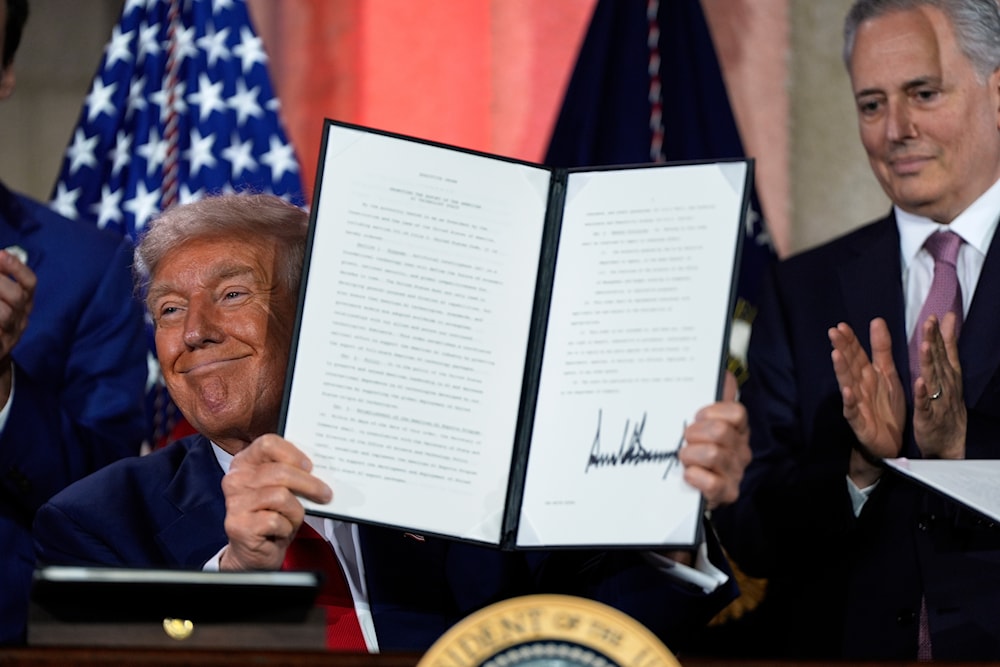Trump's push for deregulating AI finds formidable foe in the EU: NYT
Trump’s AI policy favors deregulation, but Europe’s AI Act and the Brussels Effect could shape global AI regulation and ethical standards.
-

US President Donald Trump holds a signed executive order after speaking during an AI summit at the Andrew W. Mellon Auditorium, Wednesday, July 23, 2025, in Washington (AP)
US President Donald Trump aims to unleash American AI companies on the global stage, believing that deregulation is essential for the US to dominate the AI race. His administration’s AI Action Plan seeks to strip away restrictions, arguing that innovation should take priority over safeguards, despite experts warning of risks like mass surveillance, disinformation, and even existential threats.
Yet Trump’s approach has a critical flaw, writes Anu Bradford in an opinion piece for The New York Times. While Washington may relax rules at home, it can’t stop other nations from imposing their own regulations. American AI firms will still face legal and ethical barriers abroad, limiting the reach of this deregulated push.
American companies that want to operate in international markets must follow the rules of those markets, and since the European Union, a massive economic bloc, is firmly committed to regulating AI, it could undermine President Trump’s vision of a world led by self-regulated, free-market US companies, according to Bradford.
'Brussels Effect'
The EU's digital regulations, he says, like the General Data Protection Regulation, often set global standards as companies adopt them worldwide to avoid the complexity of complying with varying regional rules. This "Brussels Effect" extends the EU's influence, as tech giants such as Apple and Microsoft apply its privacy policies across all markets. Additionally, other governments frequently model their tech laws after EU regulations, amplifying their reach.
The "Brussels Effect" could well apply to Artificial Intelligence regulations as well, after the European Union put several regulations in place to balance accountability, innovation, and transparency, the most significant of these regulations being the AI Act. The law sets safeguards to address AI's potential dangers, including privacy violations, discrimination, misinformation, and unchecked systems that could threaten human safety.
For example, the law imposes restrictions on facial recognition technology for surveillance purposes and places limits on the use of AI systems that could exhibit bias in hiring or credit assessments, meaning that American developers seeking entry into the European market will need to adhere to these and other regulatory requirements.
US firms refuse to be regulated
While some companies, like Meta, are resisting the EU's regulations by claiming regulatory overreach and even seeking support from the Trump administration to counter Europe's efforts, others, including OpenAI, Google, and Microsoft, are aligning with the EU's AI code of conduct, demonstrating a divide in corporate responses to the bloc's regulatory framework.
These tech giants recognize that cooperating with the European Union could allow them to strengthen user trust, avoid future regulatory hurdles, and standardize their global policies, as aligning with the EU's framework presents strategic advantages for their operations. Individual states in the US could use EU regulations as a template for regulations, as California did.
By maintaining its regulatory stance, Europe has the power to shape the trajectory of global AI development in ways that safeguard fundamental rights, promote fairness, and prevent threats to democratic systems, Bradford notes. It also strengthens its domestic tech industry by leveling the playing field between European AI companies and foreign competitors, all of whom must operate under the same EU legal framework, according to him.
Europe is already on this track: In the recent US-EU trade deal, Brussels committed to purchasing more American energy and military hardware but made no compromises on its tech governance policies.
European lawmakers recognize that abandoning these regulations would carry significant political consequences due to strong public backing for the continent's digital policies, while yielding to Trump's demands would undermine the EU's credibility both internationally and domestically. Any agreement dismantling AI governance frameworks would leave the rules vulnerable to shifting US political priorities.
US interests are not the only threat
Europe faces internal pressures as well, with some policymakers expressing concerns about overregulation following the influential Draghi report on European competitiveness, which highlights the continent's sluggish AI advancement and points to stringent regulations as a barrier to innovation, creating tension between regulatory safeguards and the push for technological growth.
However, Europe's slower AI progress stems from structural weaknesses, like fragmented markets, restrictive bankruptcy laws, and talent shortages, not its regulations, proving that oversight and innovation can coexist. It lags even against China, which imposes stringent rules on AI development.
Trump's aversion to regulation is the outlier in the current climate, not the opposite, Bradford maintains. Following the EU's lead, South Korea has already enacted its own iteration of the AI Act, while numerous other nations, such as Australia, Brazil, Canada, and India, are currently developing similar artificial intelligence legislation designed to address the potential dangers posed by this rapidly advancing technology.
The US withdrawal from AI governance weakens global safeguards and EU-US cooperation while allowing authoritarian models to gain influence, Bradford concludes, adding, however, that this creates a critical opportunity for Europe to lead in shaping ethical AI standards, a role it must seize rather than forfeit to appeasement or unfounded concerns.

 5 Min Read
5 Min Read








